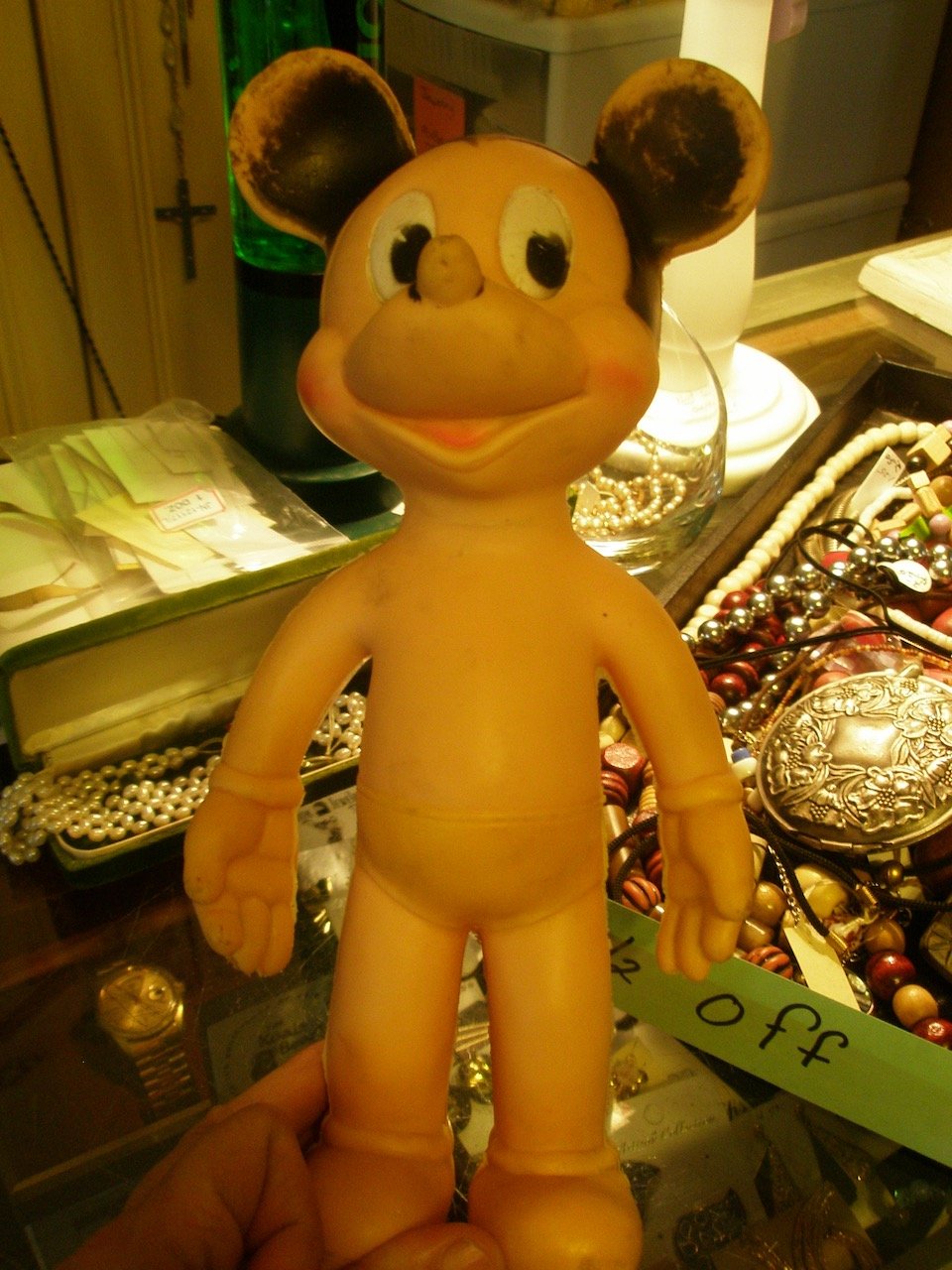Reclamation
He was mine once, and he completed me. I loved his cheery, unflappable demeanor,his unblinking gaze, the mouth that never ceased to smile. There was pink in his cheeks, a perkiness to his little black nose, and dignity in his widow’s peak, even if his hairline was a bit high. The four-fingered yellow-gloved hands hanging passively by his side were forever empty and unclenched, and he held his arms in a way that suggested a willingness to be hugged. He was a little bit squishy without being plump, and he had long ago lost his clothing but was self-possessed even in his underpants.
I certainly didn’t think of it this way at the time, but this rubber Mickey seemed to have attained a state of spiritual enlightenment. Yes, he was Buddha-like, and if I didn’t exactly rub his belly, I certainly enjoyed giving him a squeeze now and then, because that released a small satisfying squeak. I realized that he was a baby-toy, and I didn’t exactly tote him around in public, but I liked knowing he was there. Was that so wrong?
Here’s the awful part. When I had attained the advanced age of eight and had been Mickey’s owner for as long as I could remember, I came home one day to discover him gone. In an impulsive gesture of munificence that at the same time underscores the difficulties my family had with concepts such as boundaries, privacy, and personal possessions, my mother had given my Mickey away to a little three-year-old boy who lived next door. I was outraged and heartbroken. “How DARE you?” I sobbed.
My mother was genuinely surprised. She hadn’t known how much I loved that rubber Mickey Mouse. No one did. Not even me. In fact, it is quite possible that the theft of him and the giving away of him are what transformed the small glow of my affection into a veritable conflagration. My heart welled with unprecedented passion for the beloved Mickey Mouse toy.
“I didn’t realize you still played with the thing,” my mother said. Of course her words only made me angrier, because even then I suspected there might be some protocol involving inquiries made to the owner before transferring a possession. I suspected, too, that generosity with someone else’s belongings did not carry as many points in God’s book of Genuine Good Deeds. And I knew for sure that my mother, a legendary hoarder, was generally quite resistant to giving things away; I wondered what had come over her and why it had to happen with Mickey. MY Mickey. In short, I was inconsolable. My tears and frustration escalated as the melodrama fed on itself.
Even so, I was willing to let the drama play out, as it usually did, in the privacy of our home, where volatility was the norm, and eventually it would have all whimpered away. But now my mother did the next awful thing: she telephoned the mother of the little boy next door and told her that I was terribly upset and wanted my rubber Mickey Mouse back.
Oh, she gave it back to me, all right. She knocked on the door, Mickey in tow, and asked to speak to me directly. “I thought you were a much nicer girl than this,” she said, “and I thought you were a big girl, but here’s your baby-toy back, and you’ve taken it away from a little boy, and I hope you’re happy.”
I wasn’t happy at all.
I took back the Mickey Mouse, but all I felt was embarrassment and shame, and he looked at me with his blank, benign eyes, and smiled his meaningless smile. I squeezed him half -heartedly and the little squeak sounded pathetic. He had lost his Buddha-esque ability to calm me and cheer me, and it suddenly seemed he should belong to someone else. He had been my very first toy, or the first I could remember, and when I was a child, I thought as a child, but when I became a big girl, I put away childish things.
And maybe the gap in me that never goes away has something to do with my abruptly truncated relationship with Mickey Mouse. Which might explain the weird elation I experienced when I saw him lying in a showcase at one of the little thrift stores in the Valley the other day. I asked the white-haired woman behind the counter if I could hold him for a moment. “Oh, yes,” she said, “vintage 1950’s.”
I told her that long ago I’d owned one just like it, and I had loved it very dearly.
“Twenty dollars,” said the lady. “You can have him again.”
I declined.
He was a rubber Mickey, nothing more. I pictured myself bringing him home, stuffing him into a drawer somewhere, just to know I owned him. I couldn’t see the point of it. Who needs another object to remind us what's been lost?
I knew I could never reclaim it.
